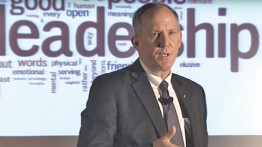Three Questions for Dr. Barry Shoop
POSTED ON: September 14, 2018

Barry L. Shoop’s appointment as the new dean of the Albert Nerken School of Engineering was announced on May 2. Shoop, professor and head of the department of electrical engineering and computer science at West Point Academy, is a presidential appointee with Senate confirmation and holds the rank of colonel in the U.S. Army. He will begin his work here in January 2019. We asked him a few questions.
What drew you to engineering?
Growing up in rural Pennsylvania in the early 1970s—the era of muscle cars—I knew my destiny was to be an automotive mechanic. My father, who spent a career as a truck driver, recommended the field of electronics; while he was not a formally educated man, his appetite for reading led him to the conclusion that this was the field of the future. I listened to his sage counsel, enrolled at Penn State University, and promptly developed a passion for electrical engineering—one that’s stayed with me ever since. Engineering is about applying knowledge of math, science, and the human condition to solve problems and create things that benefit society and humanity. Albert Einstein once said, “Scientists investigate that which already is; engineers create that which has never been.”
The other appealing aspect of engineering is that it is a profession that is not an individual sport but instead is a team sport. Today’s engineers work in diverse, interdisciplinary, and multicultural teams solving real-world problems. I am proud to be a member of a profession that changes the world.
What has been you primary research focus?
My early research was in the area of digital communication theory and applications. Later I transitioned to photonic analog-to-digital conversion based on oversampling techniques. Then, for quite a number of years, my research focused on neural network applications to signal and image processing. More recently I have focused on innovation—in particular, understanding the ecosystems that encourage and enable the development of innovation at the organizational, geographic regional, and even national levels.
What are you most looking forward to doing once you start in your new position?
I get the most personal satisfaction when I can contribute to an organization’s or individual’s success. Leadership is about setting the conditions so that others can succeed. I’ve done that in the military, as an educator, and as a volunteer in a number of professional societies. What makes me tick and makes me happy is helping complex organizations set their course and ultimately succeed. I am looking forward to getting to know better the Albert Nerken School of Engineering faculty and students and working closely with them to chart a future path to continue to deliver the high-quality engineering education that is a cornerstone of The Cooper Union, expand interdisciplinary efforts, integrate an organizational structure and culture that encourages even more innovation, and position the college to be the recognized leader in engineering education.




